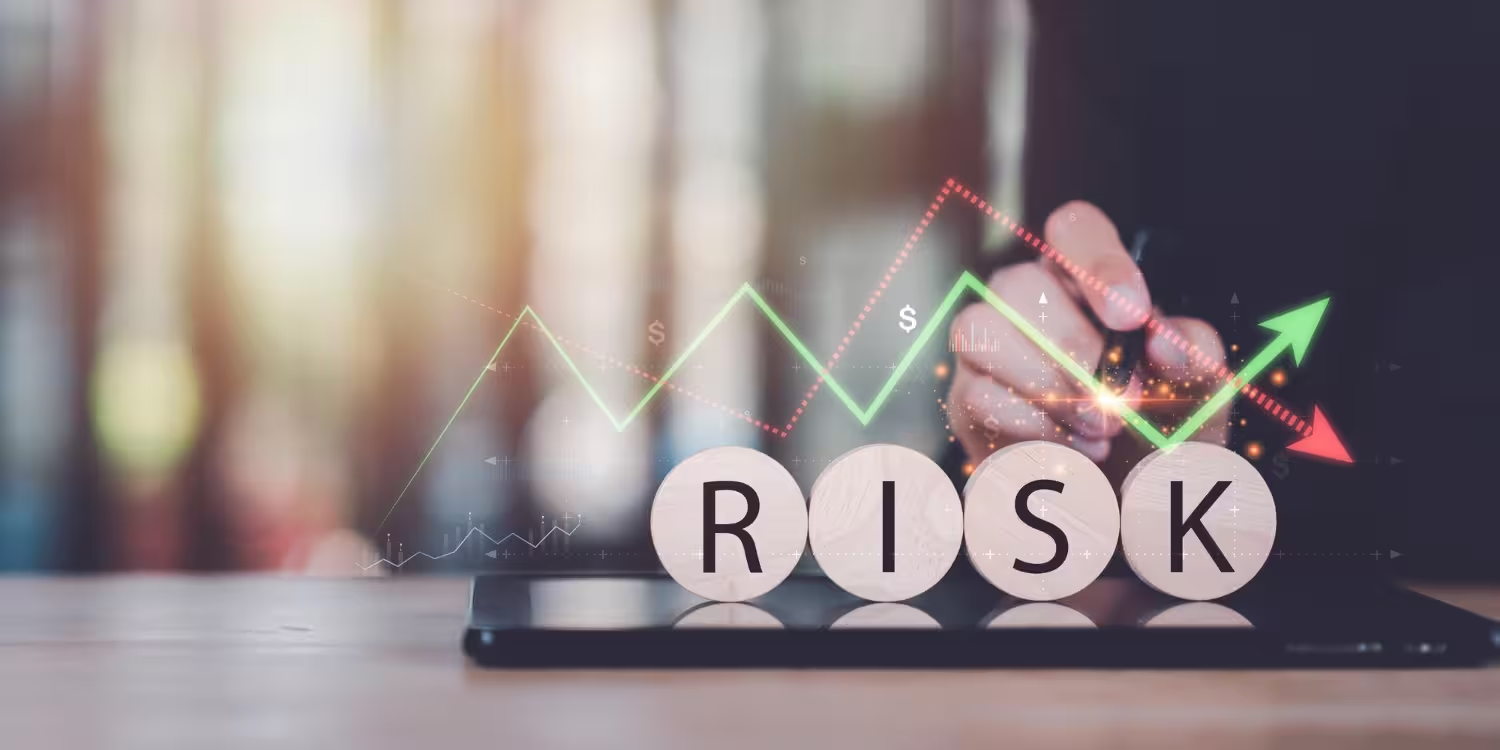The Complete List of Benefits of a Clean Desk Policy
Here is the complete list of benefits that come as the result of enforcing your employees to have a clean desk.

Doesn’t it feel like some of the policies that come as the result of working for an organization that focuses heavily on compliance are a little outrageous?
If you’re the one in charge of creating and implementing policies at one of those companies, you know how important it is to implement the more creative rules. I’m not talking about that rule surrounding the encryption of protected health information that’s mandated by the government, those are the obvious ones.
Instead, I’m talking specifically about the clean desk policy.
Put your compliance expert self in the shoes of a new employee for a second. It’s your first day, you just finished your first compliance training session, get back to your desk and start reading through your employee manual.
Halfway through the handbook, you come across the headline “clean desk policy” written in bold letters. What do you think the first thought that came across your mind would be? Most likely, you’d think it’s one of the more strange rules you’ve ever read before.
Yet, you’re not a new employee. You know that a clean desk policy is necessary to your organization’s compliance environment. Maybe you just don’t know the specific short-term and long-term benefits that come as a result of this type of guideline.
Or, maybe you’re toying with the idea of introducing a clean desk policy for the first time and want to evaluate whether or not it’s even worth presenting the idea to upper management.
Regardless of which situation you’re in, you’ve come to the right blog post. Here is the complete list of benefits that come as the result of enforcing your employees to have a clean desk.
Makes Compliance Easier
Organizations that have to constantly worry about following regulations and government audits are likely all too familiar with ISO 27001.
ISO 27001 is a section within the only internationally recognized certifiable information security standard called the ISO/IEC 27000 series. The International Organization for Standardization and the International Electrotechnical commission created this series of principles in 2013.
If you’ve never heard of the ISO 27000 series, I can’t imagine what I just explained made much sense. In a nutshell, these standards provide a baseline for information security management. They aren’t industry-specific, yet abiding by them may make it easier to adhere to more specific laws.
Let’s circle back to ISO 27001. Why is this specific section important? That portion of the series lays out specific requirements and safeguards.
Control 11.2.9 specifically calls out implementing a “clear desk policy”. Thus, officially penning it into your organization’s employee manual makes you that much closer to being an ISO 27000 certified entity.
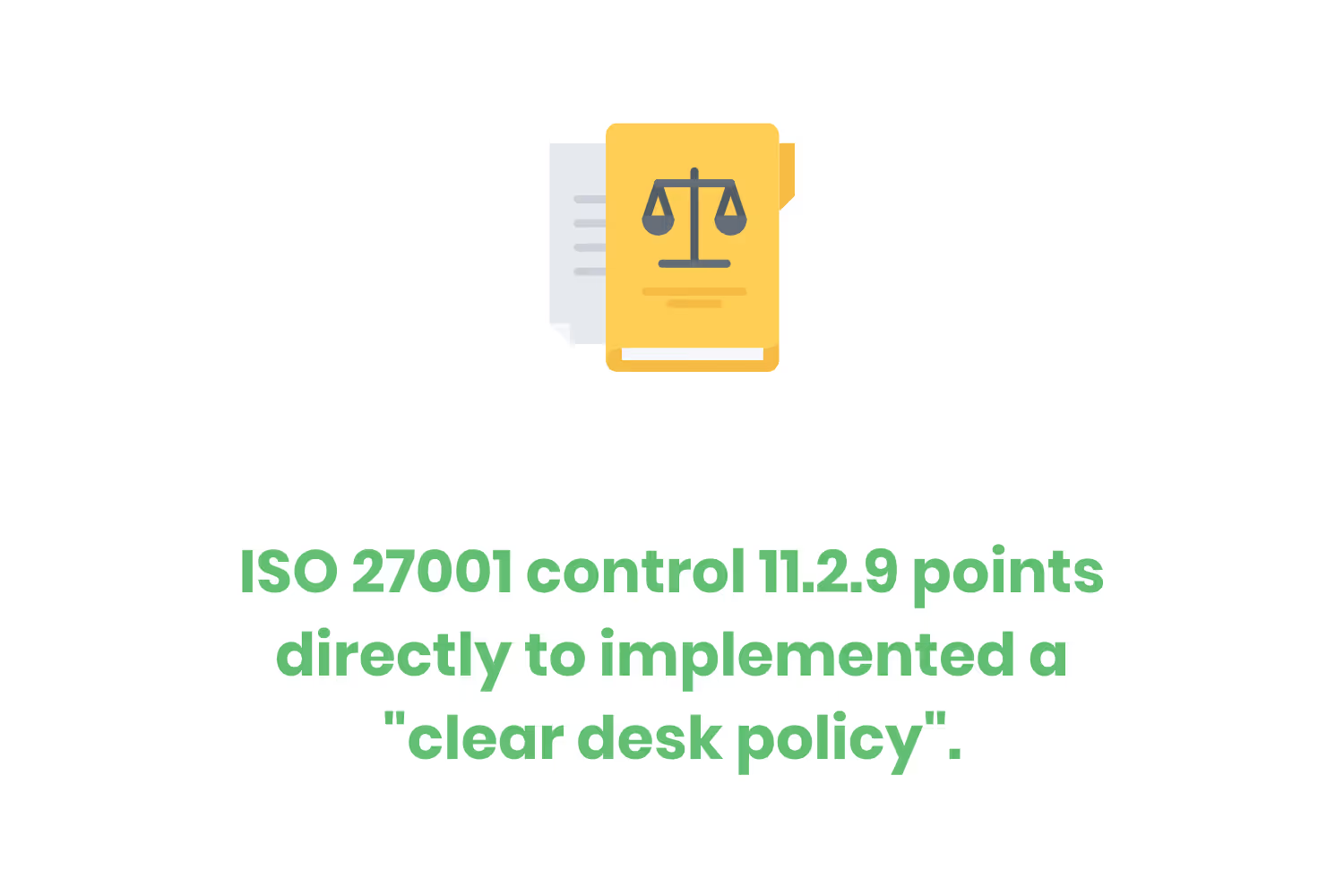
If you’re a healthcare company, accounting firm, or other financial institution, ISO simply isn’t enough. Each of those organizations has to navigate the intricacies of some of the following regulations…
- HIPAA/HITECH
- FACTA
- Gramm Leach Bliley
- Sarbanes Oxley
Yet, requiring your employees to keep their workstations clean of any papers, documents, or physical memory devices gets you that much closer to satisfying each of those regulations as well.
Stops Prying Eyes
Humans are curious creatures, it’s in our nature and there’s nothing we can do to stop all of us from doing it. This is especially true in the professional world considering many managers believe that curious people make better employees. You can’t blame your employees for their inquisitive nature, even it comes with a few quirks.
What I mean by “quirks” is having prying eyes.
We’ve all done this before at some point or another. You’re walking through the office to leave for lunch with your regular group of coworkers. Before you leave, you need to visit each person and gauge their interest. Once you get to each person’s office, they’re on their computer working diligently. You ask them if they want to go to lunch and, since they’re in the middle of working, they respond to you about 1 minute later.
What did you find yourself doing at that time?

Well, if you’re like the majority of people, you end up looking around their office, killing the time before they wrap-up whatever it is that they’re doing.
This is a form of prying eyes. It’s not malicious, but this scenario still causes a lot of stress on compliance departments.
Think about if it was malicious, though. You look around the office, find a username and password to a system within the organization that you don’t have access to and log in under those credentials. You just got into one of the most data-sensitive areas of where you work and the IT department has no idea that you’re not authorized to view it since you’re using your coworker’s credentials. This is practically an untraceable crime, that could take months or years before to determine what happened.
Yet, both malicious and accidental instances of prying eyes can’t happen with the implementation of a clean desk policy.
A Greener Alternative
By not allowing your employees to have a bunch of information and papers laying on and around their desks, you’re also operating as a greener business.
Think about it, since your team doesn’t have any place to store printed out materials they’ll lose their motivation for printing. Thus, as time goes on, even the most stubborn members of your team will get more comfortable with accessing everything virtually from their computer.
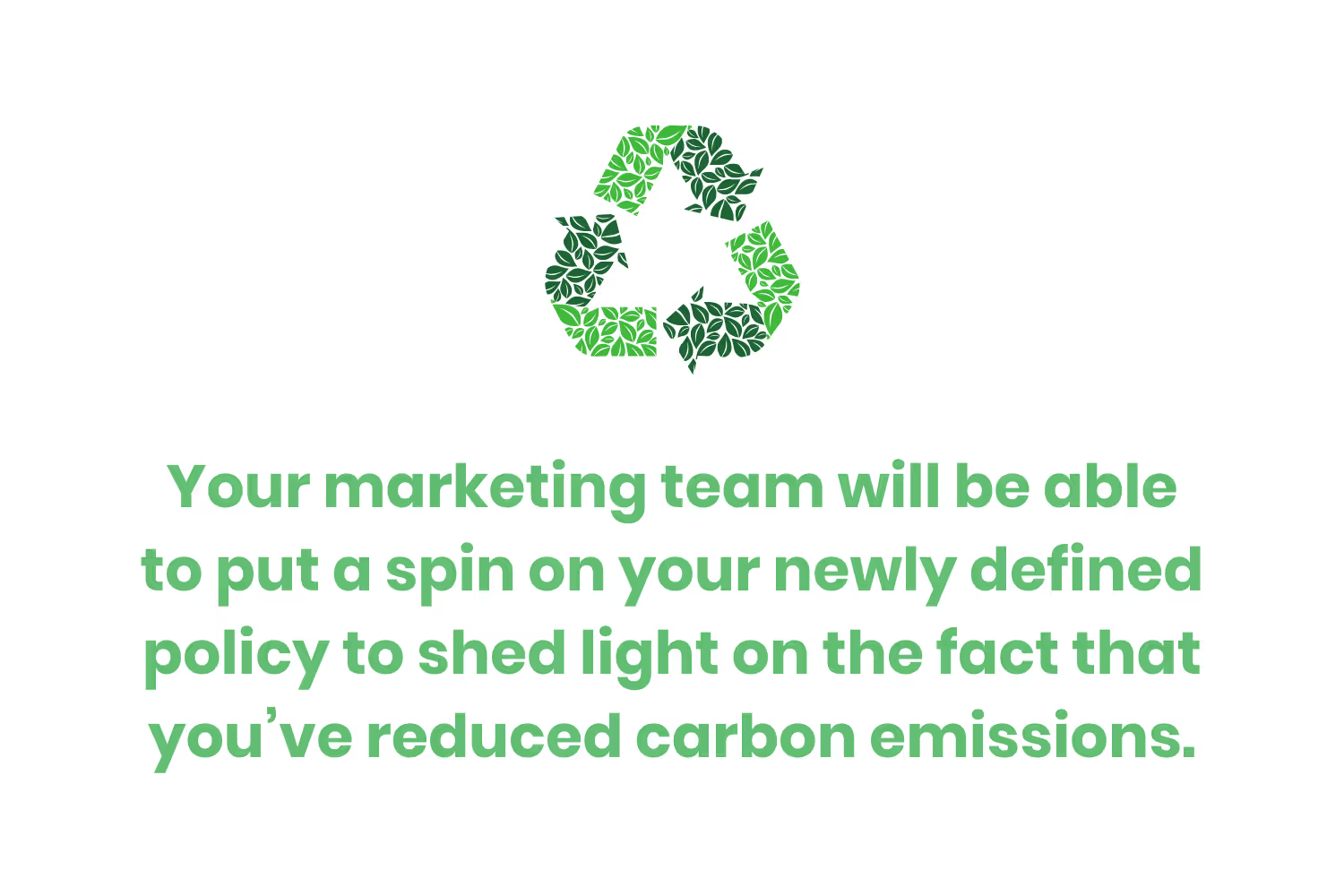
If you remember, walking into the doctor’s office in the 1990s meant staring at what seemed like endless rows of filing cabinets with patient information stored in folders. Thankfully, those days are behind us.
Sure, healthcare organizations received incentives from the government to go paperless. But, that doesn’t mean there aren’t benefits that come with not printing as much.
Your marketing team will be able to put a spin on your newly defined policy to shed light on the fact that you’ve reduced carbon emissions.
Promotes Data Backup Routines
In the past, backing up data was one of the most tedious tasks that IT departments had to handle on a daily basis. Now, it’s likely that all or at least the majority of information stored by your organization exists in the cloud.
In other words, your IT people no longer have to sit there at the end of the day to backup everything.
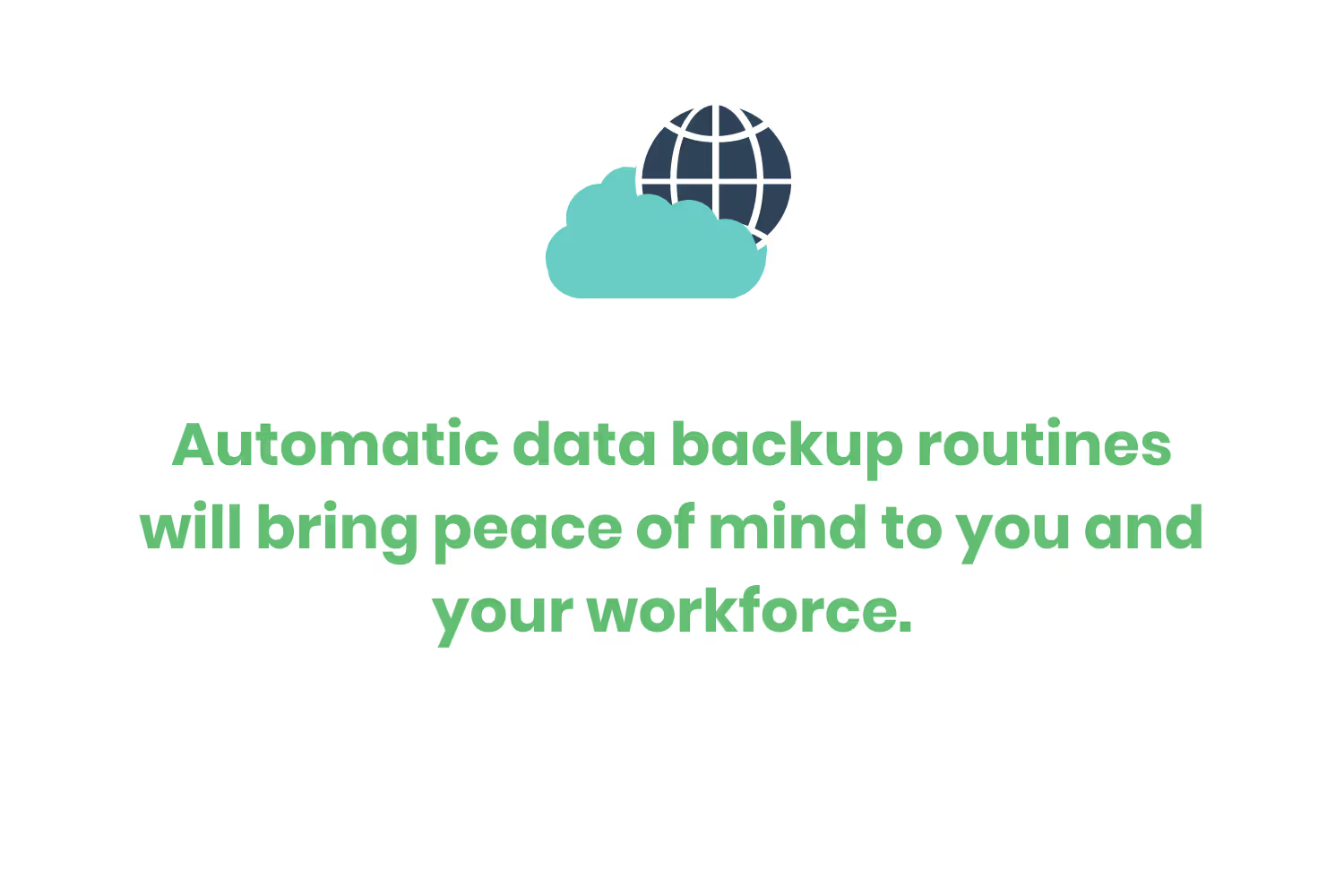
If you’ve implemented a clean desk policy, that means that the amount of paper that your organization uses is likely much lower. Thus, all documents, data and other materials that used to require a printer exist on your cloud.
As a result, you’ll need to ensure that you have data backup routines in place, on an automatic basis. This is not only a good practice, but it also brings peace of mind to all of your employees. They’ll feel safe working without having to worry about what happens to their daily progress in the case of a power outage or hardware failure.
Reduces Stress
If you’re like me, or anyone who has a good sense of hygiene for that matter, you clean your house routinely. After you get rid of all of the clutter in your home you feel less stressed, don’t you?
A 2011 neuroscience study found that clearing clutter from the home and/or work environment resulted in increased productivity, a better ability to focus and process incoming information.
In other words, there’s actual science behind the feeling you get when you realize how tidy everything is after you’ve finished cleaning. I don’t know about you, but I always feel much more relaxed afterward.
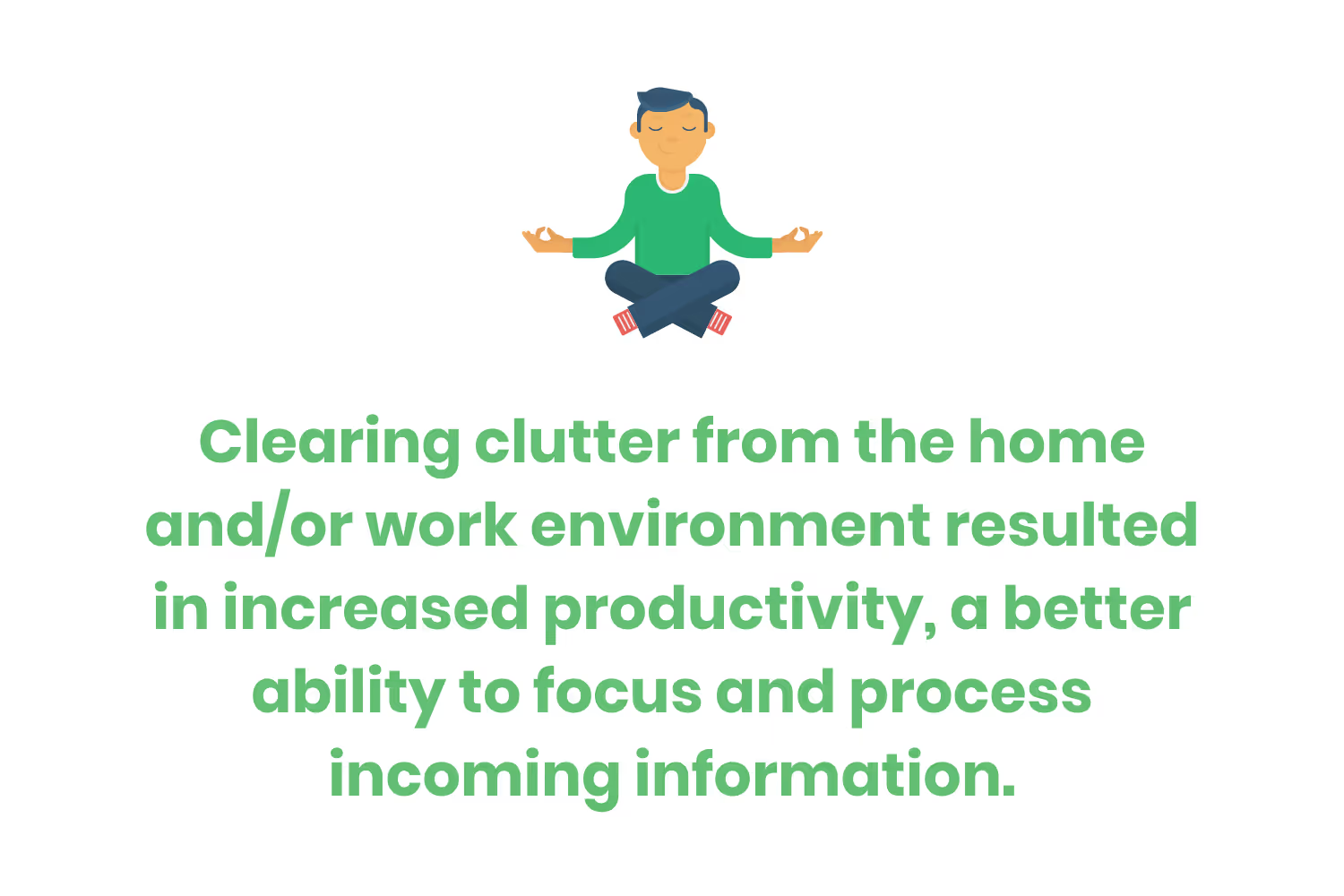
When it comes to your organization, it’s likely that you leave having clean workstations up to your employees. After all, everyone works differently and feels comfortable in their own environment.
However, if less clutter leads to a more productive workforce, all the more reason to implement a clean desk policy.
I’ll end this section with one more statistic. A different study concluded that clutter negatively influences our satisfaction with life.
Establishes a Nicer Looking Office
Have you ever walked into a bad looking waiting room at a doctor’s office or lobby at another business? How did you feel? I’m not a therapist but I can imagine that you felt uncomfortable and couldn’t put your mind at ease no matter how hard you tried.
This section goes hand-in-hand with the previous one, but it’s more focused on your client’s perspective of you.
Think about how important a first impression is on a new client or patient. You could have the best-looking website in the world, yet once they get to your office they no longer feel comfortable with you because it doesn’t look welcoming.
Some of the world’s most successful businesses are built entirely on that first impression. For example, the success of Airbnb depends on building trust between people who haven’t ever met each other before. Their co-founder, Joe Gebbia, further explained the importance of first impressions in a TED conference in Vancouver.
The reality is that 97% of people associate office environments as a symbol of whether or not they’re valued. That statistic works both ways. Employees want to feel like the organization they’re working for value what they bring to the table. Clients want to feel reassured that they chose the best organization for the services they’re receiving.
Both of those sides feel validated through a nice looking office.
You might not have the best decorations or office furniture. That’s OK, you don’t need that yet. implementing a clean desk policy is the first step toward providing a more welcoming experience.
Conclusion
I bet when you started reading this blog post you had some sort of an idea as to why you should implement a clean desk policy at your organization.
However, I’d wager to bet that you didn’t realize how many added benefits come with such a simple guideline. There’s not much to it, you state that it’s your employees are to keep their workstations clear of any devices, paper, files and notes on a daily basis and gain a ton of additional benefits beyond compliance.
Sure, some of the benefits are more long-term than others. However, over time you’ll notice that your compliance department is less stressed, productivity is up and your clients are happier.
Emphasize your product's unique features or benefits to differentiate it from competitors
In nec dictum adipiscing pharetra enim etiam scelerisque dolor purus ipsum egestas cursus vulputate arcu egestas ut eu sed mollis consectetur mattis pharetra curabitur et maecenas in mattis fames consectetur ipsum quis risus mauris aliquam ornare nisl purus at ipsum nulla accumsan consectetur vestibulum suspendisse aliquam condimentum scelerisque lacinia pellentesque vestibulum condimentum turpis ligula pharetra dictum sapien facilisis sapien at sagittis et cursus congue.
- Pharetra curabitur et maecenas in mattis fames consectetur ipsum quis risus.
- Justo urna nisi auctor consequat consectetur dolor lectus blandit.
- Eget egestas volutpat lacinia vestibulum vitae mattis hendrerit.
- Ornare elit odio tellus orci bibendum dictum id sem congue enim amet diam.
Incorporate statistics or specific numbers to highlight the effectiveness or popularity of your offering
Convallis pellentesque ullamcorper sapien sed tristique fermentum proin amet quam tincidunt feugiat vitae neque quisque odio ut pellentesque ac mauris eget lectus. Pretium arcu turpis lacus sapien sit at eu sapien duis magna nunc nibh nam non ut nibh ultrices ultrices elementum egestas enim nisl sed cursus pellentesque sit dignissim enim euismod sit et convallis sed pelis viverra quam at nisl sit pharetra enim nisl nec vestibulum posuere in volutpat sed blandit neque risus.

Use time-sensitive language to encourage immediate action, such as "Limited Time Offer
Feugiat vitae neque quisque odio ut pellentesque ac mauris eget lectus. Pretium arcu turpis lacus sapien sit at eu sapien duis magna nunc nibh nam non ut nibh ultrices ultrices elementum egestas enim nisl sed cursus pellentesque sit dignissim enim euismod sit et convallis sed pelis viverra quam at nisl sit pharetra enim nisl nec vestibulum posuere in volutpat sed blandit neque risus.
- Pharetra curabitur et maecenas in mattis fames consectetur ipsum quis risus.
- Justo urna nisi auctor consequat consectetur dolor lectus blandit.
- Eget egestas volutpat lacinia vestibulum vitae mattis hendrerit.
- Ornare elit odio tellus orci bibendum dictum id sem congue enim amet diam.
Address customer pain points directly by showing how your product solves their problems
Feugiat vitae neque quisque odio ut pellentesque ac mauris eget lectus. Pretium arcu turpis lacus sapien sit at eu sapien duis magna nunc nibh nam non ut nibh ultrices ultrices elementum egestas enim nisl sed cursus pellentesque sit dignissim enim euismod sit et convallis sed pelis viverra quam at nisl sit pharetra enim nisl nec vestibulum posuere in volutpat sed blandit neque risus.
Vel etiam vel amet aenean eget in habitasse nunc duis tellus sem turpis risus aliquam ac volutpat tellus eu faucibus ullamcorper.
Tailor titles to your ideal customer segment using phrases like "Designed for Busy Professionals
Sed pretium id nibh id sit felis vitae volutpat volutpat adipiscing at sodales neque lectus mi phasellus commodo at elit suspendisse ornare faucibus lectus purus viverra in nec aliquet commodo et sed sed nisi tempor mi pellentesque arcu viverra pretium duis enim vulputate dignissim etiam ultrices vitae neque urna proin nibh diam turpis augue lacus.


